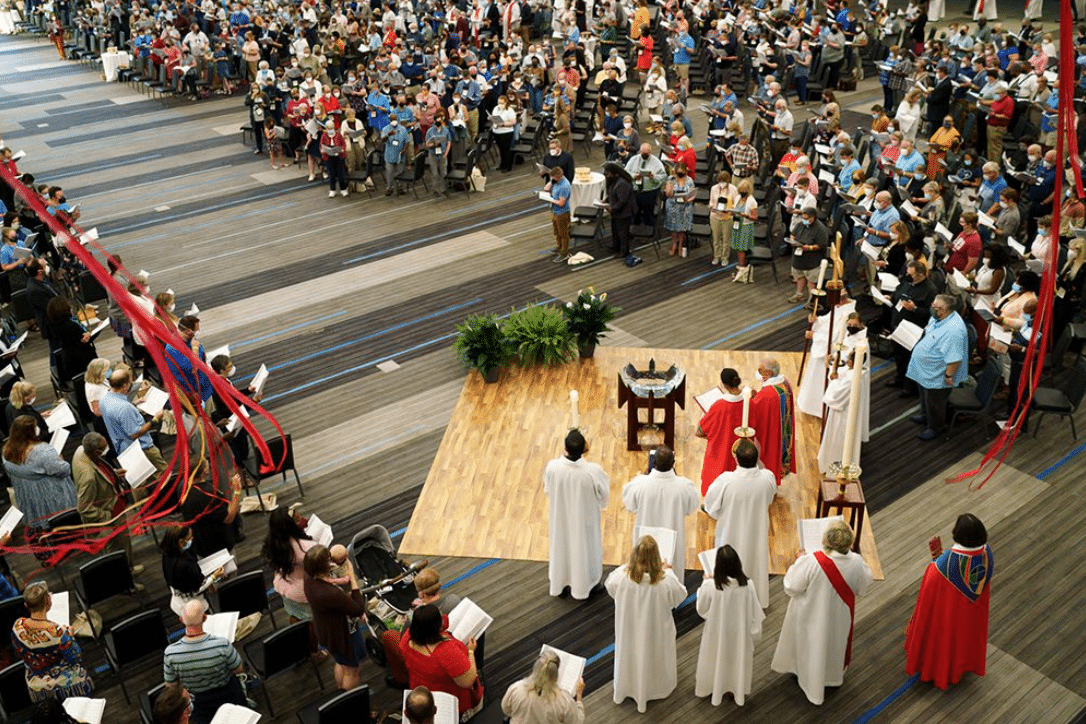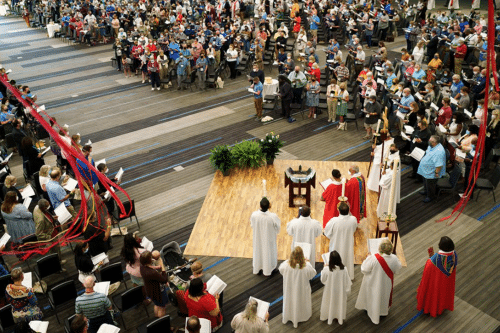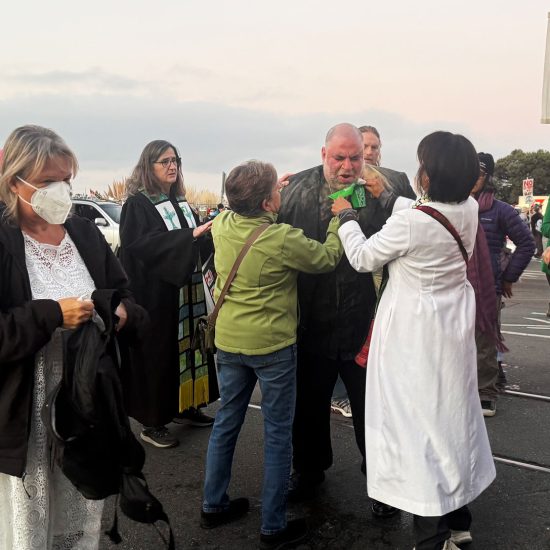

The Evangelical Lutheran Church in America Churchwide Assembly meets at the Greater Columbus Convention Center in Columbus, Ohio, Aug. 8, 2022. Photo by Janine Truppay, courtesy of ELCA
COLUMBUS, Ohio (RNS) — When the Rev. Megan Rohrer was elected bishop of the Evangelical Lutheran Church in America’s Sierra Pacific Synod in May 2021, the election was celebrated as a revolution in and outside of the United States’ largest Lutheran denomination. Rohrer became the first transgender bishop of any of the Christian churches known as the Protestant mainline.
Barely a year later, the top bishop of the ELCA asked for Rohrer’s resignation after Rohrer’s removal of the pastor of a Latino congregation on the Feast of Our Lady of Guadalupe.
What happened in the intervening 12 months can only be understood as a “perfect storm” of charismatic personalities clashing amid a heightened awareness of racism in one of the country’s whitest denominations, said Shruti Kulkarni, who maintains a website called “What Happened in the Sierra Pacific Synod?”
“Regardless of the intents of the people involved or whether it was justified or not, just the optics alone are terrible: You’ve got this white bishop from a predominantly white denomination that ruined this Latiné celebration of faith that was deeply cherished in their cultural tradition,” said Kulkarni, a recent graduate of Wartburg Theological Seminary.
On Tuesday afternoon (Aug. 9), leaders of the denomination delivered an apology to Iglesia Luterana Santa María Peregrina, formerly Misión Latina Luterana, and expressed a commitment to anti-racism at the ELCA Churchwide Assembly, the triennial meeting of the 3.3 million-person denomination taking place this week in Columbus, Ohio.
“This is in response to recent events in this church that have caused harm to people, communities and the whole body of Christ,” said a church press release.
The celebration that followed Rohrer’s election last year wasn’t just about Rohrer’s identity — Rohrer, who uses the pronoun “they,” is also neurodivergent — ELCA Presiding Bishop Elizabeth Eaton said at the time. It was about all the gifts they bought to the church, including their focus on those who have been marginalized.
“What this means for the whole denomination, I believe, is that when we say, ‘All are welcome, and there’s a place for you here,’ we mean this,” Eaton said at the time.
Rohrer had only officially been in office three months when they appeared at another celebration on Dec. 12, the Feast of Our Lady of Guadalupe, a sacred and culturally significant day for many Latino Christians. Misión Latina Luterana, a Latino congregation in Stockton, California, had planned a service featuring Aztec dance and prayers and liturgical music by a mariachi band.
But, according to a listening team report on the day’s events, Misión Latina Luterana’s pastor, the Rev. Nelson Rabell-González, was not in attendance. The service was led instead by the Rev. Hazel Salazar-Davidson, the synod’s assistant to the bishop for authentic diversity, inclusive community and service. When the congregation began to shout questions about Rabell-González’s whereabouts, Rohrer, who was sitting in the pews, went to the front of the sanctuary and informed the congregation that they had removed Rabell-González from his position that morning.
In a statement on the Sierra Pacific Synod’s blog, the synod council said it had unanimously decided to vacate Rabell-González’s call at Misión Latina Luterana after receiving “continual communications of verbal harassment and retaliatory actions” by the pastor “from more than a dozen victims from 2019 to the present,” it said.
“The severity of the situation required immediate action to safeguard the Latinx community,” according to the statement.
Rabell-González has denied those accusations to Religion News Service.
Salazar-Davidson said she warned Rohrer of the cultural implications of removing the pastor on the Feast of Our Lady of Guadalupe, but she said Rohrer told her the timing was dictated by ELCA policy.
“This was devastating because, no matter how many times or ways I explained it, no matter how much I said how significant December12th was to an entire culture, I was not heard. Our culture was not heard. Our ancestors were not heard. The people and the culture did not matter — policy did,” Salazar-Davidson told RNS in an email.
“It was devastating to watch a community that I belong to and care for on such a deep level be hurt.”
Within days, groups across the denomination had joined the outcry.
Asociación de Ministerios Latinos de la ELCA released a statement saying the bishop and council’s removal of the pastor on “one of the most important days for our Latinx community” showed “a lack of empathy and understanding toward their Latinx siblings.”
“This unfortunate situation is a clear and painful example of how systemic racism is deeply rooted in our church, and the long journey ahead of us to dismantle it,” it said.
Extraordinary Lutheran Ministries, which organizes queer ministry leaders in the ELCA and had ordained Rohrer before the ELCA ordained LGBTQ people, announced it was suspending Rohrer’s membership, citing “an existing pattern of behavior.”
A little more than a week later, Rohrer posted a public apology on the synod’s blog, saying they hadn’t understood the impact removing the pastor on the Feast of Our Lady of Guadalupe would have on “the greater church.”
But as word of what had happened at Misión Latina Luterana continued to spread, Eaton announced a three-member listening team to investigate. Eaton received the listening team’s report in early June. Shortly thereafter, she requested Rohrer’s resignation and later, at the listening team’s urging, made the report public.
The release of the report coincided with the Sierra Pacific Synod’s meeting, and Rohrer’s fate became the subject of a two-hour forum on the developments.
“This pains me to say that as much as Bishop Megan has done for LGBTQ inclusion, that effort has not translated to the Latiné community,” said the Rev. Dawn Roginski, interim pastor of St. Andrew’s Lutheran Church in San Mateo, California. “We cannot pick and choose where to be inclusive. We need to be inclusive of all people as a synod.”
Rohrer and Salazar-Davidson both spoke, as did a woman who identified herself as the pastor who spoke up a year earlier against Rabell-González. A measure to remove Rohrer as bishop was voted down.
Days later, Rohrer resigned, and Eaton announced she would be initiating the denomination’s discipline process against the former bishop.
In the months since, Bishop Claire Burkat has stepped in as interim bishop of the Sierra Pacific Synod.
On July 17 — her first Sunday in the synod — Burkat visited Iglesia Luterana Santa María Peregrina, formerly Misión Latina Luterana, which had lost its funding and support from the denomination when it lost its pastor. The congregation continues to meet with a new name and a new location, led by Rabell-González.
The interim bishop said in a letter to the synod that she promised the congregation an investigation into the circumstances of Rabell-González’s removal and an opportunity for the pastor to publicly address the complaints against him.
She apologized to Iglesia Luterana Santa María Peregrina for the lack of pastoral care and visitation following such a traumatic day, calling the apology the first of many owed to the congregation.
Burkat said in a written statement to RNS that her visit was intended as “just the first step in bringing this worshiping community back into communion with the Sierra Pacific Synod and the Evangelical Lutheran Church in America.” She promised to talk to the synod and denomination about renewing funding for the mission.
The congregation, Rabell-González and representatives of the ELCA’s Latino community all had requested a public apology at churchwide assembly, according to a report by Asociación de Ministerios Latinos de la ELCA, calling it the “first step in a potential process of healing and reconciliation.”
Rabell-González and Salazar-Davidson were not there when the apology was delivered at at the denominational meeting.
Salazar-Davidson has said she was diagnosed with post-traumatic stress disorder and filed for workers’ compensation. She’s wrestled with “what ifs” since the day Rabell-González was removed from his congregation, she told RNS. She’s wondered if there is more she could have done to prevent it.
“But the truth is that the institution has not been created for people like us,” she said.
Iglesia Luterana Santa María Peregrina deserves an apology, Salazar-Davidson said, but she added that an apology is meaningless without action, determined in partnership with the marginalized groups affected.
“The church has apologized in the past,” Salazar-Davidson said. “It has made statements responding to Indigenous racism, homophobia and transphobia, ableism, and others. But what good are the statements if no quality action follows? What good are they if there is no relationship?”
Rohrer wasn’t at the assembly for the apology either. They’re in Israel, where, they told RNS, they are learning about peacemaking efforts, supporting Israeli LGBTQ individuals and those in the occupied territories and discerning God’s call for the next chapter of their life.
“I support all efforts to provide care, healing and reconciliation for all affected from 2019 to the present,” Rohrer said.
Several measures addressing the ELCA’s policies and procedures have been proposed for this week’s sessions at churchwide assembly, including a measure to create a commission to study restructuring the denomination that was approved before Tuesday’s apology.
People are paying attention, according to Kulkarni. Tens of thousands of people have visited her website to find out what’s happening.
“The fact that the conversation is even happening is a very good sign it could lead to change,” she said.
RNS national reporter Alejandra Molina contributed to this report.






